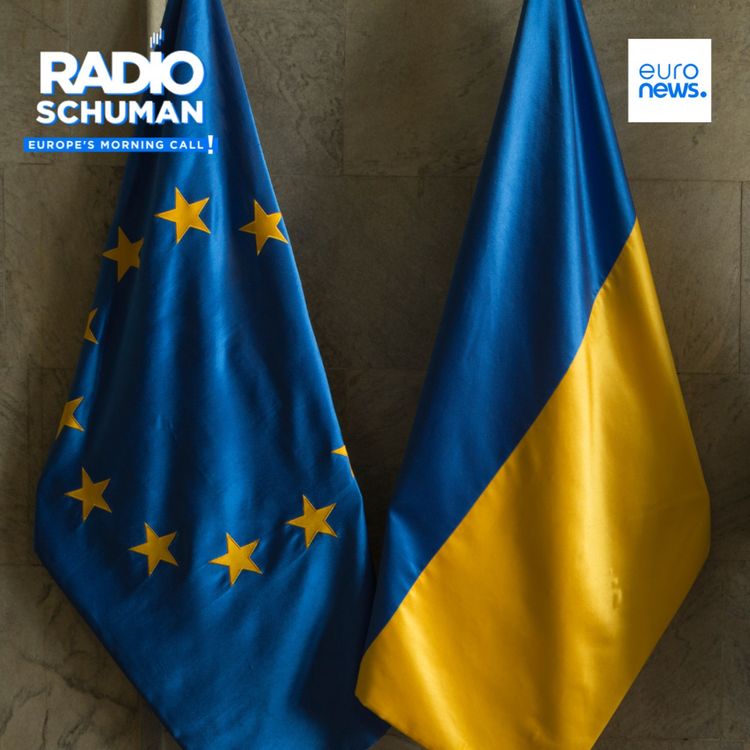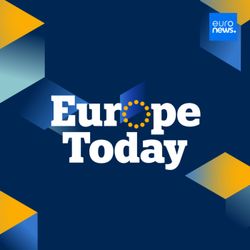Share

Radio Schuman
Ukraine, Trump and Syria dominate agenda at European Council
As EU leaders gather in Brussels today for a one-day summit, Radio Schuman previews expectations for leaders' discussions with Euronews journalist Jorge Liboreiro.
Key topics on the agenda include the current state of EU support for Ukraine, the anticipated return of Donald Trump to the White House in January, and the EU's next steps in addressing Syria's fragile political landscape following the collapse of Bashar al-Assad’s regime.
Today is also the António Costa’s inaugural summit as European Council President and the first time French President Emmanuel Macron has missed the gathering, as he attends to the devastating aftermath of Cyclone Chido on the French island of Mayotte.
We also examine a new study on jobs that may help reduce the risk of developing Alzheimer’s disease.
Radio Schuman is hosted and produced by Maïa de la Baume, with journalist and production assistant Eleonora Vasques, audio editing by David Brodheim and Georgios Leivaditis. Music by Alexandre Jas.
Europe Today is Euronews’ daily podcast hosted by Maria Tadeo and Méabh Mc Mahon, broadcasting directly from Brussels, at the heart of Europe.
Every morning, we deliver the top and exclusive stories shaping the European Union (EU) and beyond.
Stay ahead with the key news and insights that matter in Europe today.
More episodes
View all episodes

Can the EU ever become a superpower?
07:00|At a medieval castle in the Belgian countryside last week, European leaders gathered to discuss competitiveness, deregulation, industrial policy and the future of the Single Market. In this episode, we unpack what this retreat was all about: Who’s pushing for cutting red tape? Who wants deeper integration? Is deregulation the key to the EU’s economic growth? Is “pragmatic federalism” the secret ingredient for a powerful Europe? To answer these questions, we sit down with MLex managing editor for Europe, Kait Bolongaro, president of Eurochambres, Vladimír Dlouhý and President of the Foundation for European Progressive Studies and former EU Commissioner, Nicolas Schmit. This is an extract from the weekly Euronews podcast Brussels, My Love?. To continue listening, visit the Brussels, My Love? feed on your favourite podcast app. You can also find us on YouTube and on our website.
50. Does everybody really want to join Trump's Board of Peace?
19:46||Season 3, Ep. 50On Europe Today, your daily Euronews podcast, presented by Méabh Mc Mahon we speak with Francesca Albanese, the UN special rapporteur for Palestine who is under fire and with several countries asking for her resignation. Our correspondent Maïa de la Baume reports on the first meeting of Donald Trump's Board of Peace and the controversy the participation of European Commissioner Dubravska Suica brought. To get up to date with the tensions in Iran and a possible US intervention, we bring in analyst Tomi Huntanen from the Wilfried Martens Centre. We speak with our Culture editor Tokunbo Salako about the arrest of former British Prince Andrew.
49. Putin "never wants" peace, says 5th Georgian president
20:12||Season 3, Ep. 49On Europe Today, your daily Euronews podcast, presented by Méabh Mc Mahon we speak to Salomé Zourabichvili, a Georgian politician who served as the president of Georgia from 2018 to 2024, the first female to take on this role. Our correspondent Maïa de la Baume brings us the latest in the backlash the Commissioner for the Mediterranean has recieved from the EU countries for her participation in Trump's Board of Peace. We travel to Lisbon to speak to our correspondent João Azevedo about the racism suffered by the Real Madrid player Vinicius Junior in a Champions League match.
48. Is the EU-US relationship really going better? We ask the US ambassador to the EU
19:33||Season 3, Ep. 48On Europe Today, your daily Euronews podcast, presented by Méabh Mc Mahon we speak to Andrew Puzder, US ambassador to the EU about the latest in the relationship between the EU and the US. We also welcome in our studio the new president of the European Economic and Social Committee, Séamus Boland. Our Ukraine correspondent, Sasha Vakulina, updates us in the latest developments in the peace negotiations in Geneva.
47. Want to work for the European Union? Apply now!
19:59||Season 3, Ep. 47On Europe Today, your daily Euronews podcast, presented by Méabh Mc Mahon, we look ahead to the peace talks resuming in Geneva today nearly four years after Russia’s invasion of Ukraine. With pressure from Donald Trump and doubts raised by Marco Rubio, are negotiations moving forward — or nowhere at all? We also have an update on Emmanuel Macron’s visit to India just three weeks after the EU’s landmark deal with New Delhi. And in Hungary, Viktor Orbán faces mounting pressure from challenger Péter Magyar as US backing enters the campaign. Finally, we bring you up to speed on the Epso exam required to get a job in the EU.
46. The "world ahead is made of many differences" says Pothier over the EU-US relationship
19:17||Season 3, Ep. 46On Europe Today, your daily Euronews podcast, presented by Mared Gwyn, we get you up to date over what happened this weekend at the Munich Security Conference with our EU editor Maria Tadeo. We also speak with Fabrice Pothier, CEO of Rasmussen Global and our Defence reporter, Alice Tidey, helps us explore the debate over an European nuclear umbrella. We then cross to Berlin with our correspondent Laura Fleischmann to speak over the controversial jury comments at the Berlinale Film Festival.
From Brazil to Brussels: What's the beef with the Mercosur trade deal?
07:27|Which EU leader would you choose for a dinner date this Valentine's Day? And is the EU-Mercosur deal as big an opportunity as it has been portrayed?To discuss these topics, we sat down with Pedro Miguel da Costa e Silva, Brazil’s ambassador to the EU, Adélaïde Charlier, Belgian climate and human rights activist and Teresa Küchler, European correspondent for Swedish daily Svenska Dagbladet.This is an extract from the weekly Euronews podcast Brussels, My Love?.To continue listening, visit the Brussels, My Love? feed on your favourite podcast app.You can also find us on YouTube and on our website.
45. "It's the year to save cars", says European Parliament president Roberta Metsola
19:37||Season 3, Ep. 45On Europe Today, your daily Euronews podcast, presented by Méabh Mc Mahon we speak in an exclusive interview with European Parliament president Roberta Metsola at the Belgian castle where EU leaders met yesterday. We also speak with European Commissioner for Sports, Glenn Micallef, about the disqualification of an Ukranian athlete at the Winter Olympics over a helmet picturing dead ukranian athletes. We also travel to Munich to our EU news editor Maria Tadeo ahead of the Munich Security Conference.
44. Hungarian election campaign heats up with sex tape blackmail
19:00||Season 3, Ep. 44On Europe Today, your daily Euronews podcast presented by Méabh Mc Mahon, we cover the latest from today’s EU leaders’ retreat in the Belgian countryside and look at the possibility of fresh elections in Ukraine. We’re joined by former Greek finance minister Yannis Varoufakis and we get an update on the Hungarian election campaign’s dirty laundry from our correspondent, Sándor Zsíros.